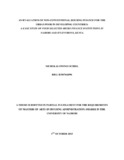| dc.description.abstract | Kenya has a well-regulated financial system for its level of development. However, the mortgage finance sector which is competitive and innovative, serves only those households at the top of the income pyramid. This compounded by enactment of various legislation to regulate micro-finance institutions has further worsened the situation.
Even though sometimes public sector housing finance institutions have offered longer term loans to lower income groups, these have largely been restricted to borrowers with clear land title and certifiable income, a condition only met by a few public low-income housing projects, the vast majority of the target population remains excluded.
This study acknowledges that micro-finance for housing is an effective approach to the housing finance problem for the low-income earners. The approach reflects and builds on the progressive income of poor families and the progressive or incremental mode of constructing houses. The study has referred to these methods as Non-Conventional Housing Finance (NCHF) approaches.
NCHF approaches have succeeded in other countries like in the Latin America (e.g. Chile, Brazil), South Africa, among other countries, some of which were then at the same development level as Kenya. Therefore, the study sought to answer the question ‗Why has NCHF approaches as means of home ownership acquisition by urban low income households, not been significantly employed in Kenya to fill in the void or gap created by Conventional housing finance and/or mortgage industry‘.
By adopting the exploratory approach through case studies, the research evaluated the existing typologies of NCHF as provided by the different organizations - the Providers, where various models - Product Types, were established. Further analysis of each of the key attributes was done. The various policy and legislative positions (written or unwritten) dealing with these Product Types were also analyzed. From the on-course projects, the level of customer satisfaction with these NCHF models was also a key unit of analysis. The products were categorized by the study as type 1 – for new housing projects, type 2 – for housing rehabilitation, type 3 – for infrastructure, type 4 – for resettlement and type 5 – for comprehensive models.
It was found out that in Kenya, NCHF concept has been frustrated both by existing legal framework and Government policy. The legal framework has made it very difficult for the
ix
providers to avail housing finance to the urban poor due to the stringent provisions imposed on the providers that make the process expensive and untenable.
The study recommended a housing finance model that encompasses policy and legislative changes which would lead to appropriate macro-economic and regulatory frameworks for housing finance for the urban poor to leverage the urban poor housing stock. This must recognize that the urban poor build their houses incrementally. In addition, the policies and the legal frameworks must encourage the provisions of land, basic infrastructure and social services to the urban poor through recognition of the current ownership rights of the poor on the land that they own and occupy. | en_US |



